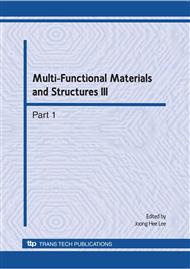p.435
p.439
p.443
p.447
p.451
p.455
p.459
p.463
p.467
Thermal Relaxations of Polymers Revealed by Reversing and Non-Reversing Coefficient of Thermal Expansion
Abstract:
Reversible and irreversible events can be resolved) using modulated temperature DSC and TMA. Each technique has advantages, those for TMA include longer times and slower scan rates that allow greater approach to material equilibrium. The thermal expansion coefficient and glass transition temperature can be isolated from relaxations and structural changes. Modulated temperature thermomechanometry (mT-TM) is used to characterize amorphous thermoplastics including PS, PMMA, PC and PPO, and the results including annealing, heating and cooling.
Info:
Periodical:
Pages:
451-454
Citation:
Online since:
August 2010
Authors:
Price:
Сopyright:
© 2010 Trans Tech Publications Ltd. All Rights Reserved
Share:
Citation:


